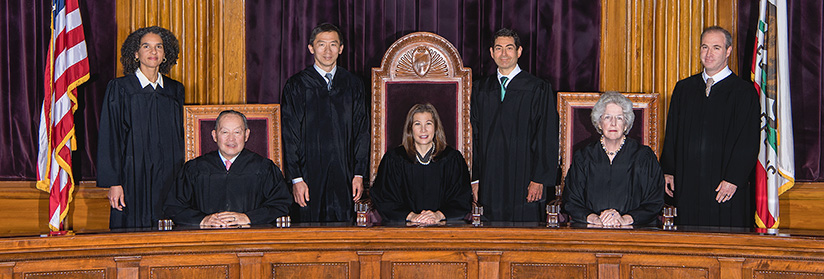
California Supreme Court Justices (courts.ca.gov)
Court of Appeal Decides Key Budget Bills Case 3-0
Howard Jarvis Taxpayers Association v. Shirley Weber
By Chris Micheli, November 3, 2021 2:15 am
After four years of waiting, the Third District Court of Appeal ruled 3-0 in Howard Jarvis Taxpayers Association (HJTA) v. Shirley Weber (Josh Newman, et al., Real Parties in Interest). HJTA had brought two petitions for writ of mandate in an effort to challenge the constitutionality of legislative amendments contained in two different bills that changed the procedures governing the recall of state officers.
The Legislature had changed the law regarding several of the procedures used in the recall of a state officer, including legislators, when it adopted SB 96 in June 2017. HJTA filed its petition arguing that SB 96 was unconstitutional because it violated the single-subject rule contained in Article IV, Section 9 of the state Constitution. The court granted the writ and stayed enforcement of SB 96.
Thereafter, the Legislature adopted similar, but modified, changes to the recall procedures in SB 117, which was a budget-related bill. HJTA filed a writ challenging this bill on several grounds, including that the bill was a not a valid budget-related bill that could be passed by a majority vote and take effect immediately.
The Third District Court of Appeal specifically requested the parties to this litigation to address these two questions: “Does the Legislature of the State of California have the authority to (1) amend the budget bill by a majority vote, and (2) adopt ‘other bills providing for appropriations related to the budget bill’ to become effective immediately by a majority vote”?
The appellate court ruled 3-0 against the writ petitions in a published decision providing guidance on the interpretation of Proposition 25, which was adopted by the voters in November 2010 to make the budget vote requirement majority, rather than 2/3. Prop. 25 amended Article IV, Section 12 of the state Constitution.
The California Constitution, in Section 12(e)(1), now provides that the Legislature may pass both “the budget bill” and “other bills providing for appropriations related to the budget bill” by a simple majority vote, to take effect immediately after being signed by the Governor. In addition, Section 12(e)(2) defines “‘other bills providing for appropriations related to the budget bill’” to “consist only of bills identified as related to the budget in the budget bill passed by the Legislature.”
In August 2017, the Legislature enacted and the Governor signed SB 113 and SB 117. SB 113 was a “budget bill junior” as it amended the budget bill that had been adopted in June 2017. SB 113 contained a list of bills that were designated as “related to the budget bill” and would be effective immediately upon being chaptered. SB 113 contained an appropriation for the costs of a state senate recall.
SB 117 was one of the bills designated in SB 113 as being “related to the budget bill” and SB 113 contained a legislative finding and declaration that “numerous bills, including Senate Bill No. 117, are other bills providing for appropriations related to the Budget Bill within the meaning of subdivision (e) of Section 12 of Article IV of the California Constitution.”
SB 117 repealed the recall provisions of SB 96 and enacted similar provisions with a few changes. Section 17 of SB 117 provided the language that SB 117 is “a bill providing for appropriations related to the Budget Bill within the meaning of subdivision (e) of Section 12 of Article IV of the California Constitution, has been identified as related to the budget in the Budget Bill, and shall take effect immediately.” Both SB 113 and SB 117 were adopted by a majority vote of both houses of the Legislature and signed into law by the Governor.
The Third District Court of Appeal, in analyzing the HJTA challenge, said that “we presume that the challenged statute is constitutional and uphold it unless its unconstitutionality “‘“clearly, positively and unmistakably appears.”’ In addition, the appellate court said, ”We do not look to the Constitution to determine whether the Legislature is authorized to do an act, but instead consider only whether it is prohibited.”
The first claim by HJTA was that SB 117 violated a right to a speedy recall election and that the additional procedural hurdles to the recall process instituted by SB 117 violated voters’ due process rights. The appellate court rejected this claim because the “petitioners fail to cite any language in the California Constitution to support this assertion of a right to a speedy and immediate recall election.” Also, the Legislature has the power to adopt rules related to the recall procedure and exercised that power in SB 117.
The second claim by HJTA was that the issues before the court were identical to and already resolved by the appellate court in an unpublished opinion from 2013. The court disagreed saying the prior case dealt with “spot bills” that had been identified in the budget bill as being related to the budget even though they did not have any substantive content in those spot bills.
The appellate court in that prior case ruled that “section 12 does not allow the Legislature to name empty spot bills in the budget bill and only after the budget bill is passed to fill those placeholders with content as urgency legislation.” Specifically, the court ruled that “a spot bill referenced in the budget bill is neither identified nor a bill.”
In this case, on the other hand, the Third District Court of Appeal said that SB 117 is not a spot bill. Instead, it was a “new budget bill” (which we commonly refer to as a “budget bill junior”).
The third claim by HJTA was that only the budget bill can be passed by majority vote and that all other budget-related bills must be passed by a two-thirds vote. The Third District Court of Appeal rejected this argument and called it “a cramped, restrictive reading of Proposition 25.” HJTA argued that Section 12 of Article IV refers to “the budget bill” and that its majority vote provision only applies to “the budget bill.”
The appellate court said that the phrase “the budget bill” must be considered in context and that the California Supreme Court has already determined that budget bills junior are part of the budget bill. According to the state’s high court, “There is no substantive difference between a Governor’s reduction of an item of appropriation in the original 2009 Budget Act . . . and a Governor’s reduction of that same item in a subsequent amendment to the 2009 Budget Act.” In other words, the Supreme Court said both the original budget act and the later reductions were an “extensive and multi-itemed budget bill.”
In addition, in the City of Cerritos v. State of California (2015) 239 Cal.App.4th 1020 case, the Third District Court of Appeal ruled that the phrase “other bills providing for appropriations related to the budget bill” include trailer bills, if those trailer bills contain appropriations and are identified as being related to the budget in the budget bill.
Finally, in its written decision in this case, the appellate court reasoned that SB 117 contained an appropriation and SB 113 identified SB 117 as “a trailer bill providing for appropriations related to the budget bill.” Based upon the plain language of Article IV, Section 12(e) of the state Constitution, SB 117 is a bill that provides for appropriations related to the budget bill and became effective immediately with a simple majority vote.
- Endangered Species Regulation - February 19, 2026
- Renewal of Judgments - February 18, 2026
- Hearings on Third-party Claims - February 18, 2026



